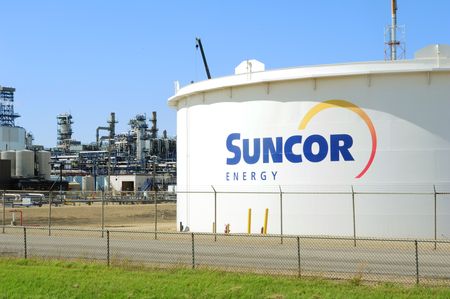By Nia Williams and Rod Nickel
(Reuters) – Suncor Energy’s acquisition of a larger stake in the Fort Hills oil sands project is a sign that Canada’s second-largest oil company is looking for alternatives to extending the life of its biggest mine, which has run into political obstacles, industry observers said.
The purchase indicates Suncor is looking to acquire new bitumen supply to replace production from its Base Mine instead of, or in addition to, developing its own oil sands leases, energy consultancy Wood Mackenzie said, raising expectations of more deals.
Suncor’s Base Mine is a key part of the company’s operations in northern Alberta, producing around 200,000 barrels per day (bpd) of bitumen used to feed upgraders at its oil sands base plant that produce higher-value synthetic crude. The open pit mine, operating since 1967, is expected to run out of bitumen by the mid-2030s.
The company proposed the Base Mine Extension project, an expansion of the existing mine to produce 225,000 bpd from around 2030, but the federal government said in April that the mine would not pass an environmental review because projected emissions are too high..
Canada’s oil sands hold the world’s third-largest crude reserves and the long-life projects can produce for decades. However, carbon-intensive new mines are difficult to square with Ottawa’s goal of reaching net-zero emissions by 2050, making it important to keep existing ones running.
Last week Suncor agreed to buy Teck Resources’ Fort Hills stake for about C$1 billion ($737 million) in cash as “part of our Base Plant mine replacement strategy”. The deal increases Suncor interest in the project to 75.4%, giving it higher share of bitumen output.
“This is the first time Suncor has hinted at the risk that (Base Mine Extension) may not be going ahead,” said Mark Oberstoetter, Wood Mackenzie’s head of Upstream Americas.
Oberstoetter said the extension is likely still Suncor’s base-case scenario, but interim CEO Kris Smith’s comments around Fort Hills suggested the company was looking at alternatives.
Suncor did not respond to requests for comment. It releases quarterly results on Wednesday.
Other acquisition targets could include French major TotalEnergies’ stake in Fort Hills and its 50% share of the Surmont thermal oil sands project, Oberstoetter added.
Last month TotalEnergies said it plans to spin off its Canadian oil sands assets into a separate company.
Jamie Bonham, director of corporate engagement at NEI Investments, a Suncor shareholder, said for oil companies, consolidation seemed a safer bet than developing new assets that may have cost overruns or become stranded assets if oil demand wanes faster than expected during a transition away from fossil fuels.
“This doesn’t increase the overall number of barrels being added, (so) it could be aligned with a low-carbon transition path,” Bonham said.
The Fort Hills deal is the latest move by Calgary-based Suncor to focus on its core oil sands business. Earlier this year the company sold its wind and solar assets and Norwegian oil assets.
It is unusual for companies to make big acquisitions while under an interim CEO, but prioritising core assets was a key demand of activist firm Elliott Investment Management, which disclosed a Suncor stake in April.
Suncor’s previous CEO Mark Little resigned in July after a string of fatalities at Suncor sites.
(Reporting by Nia Williams; Editing by Cynthia Osterman)

